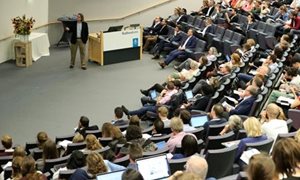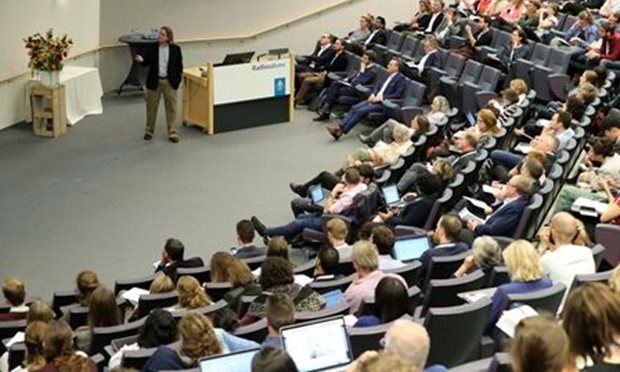

Summary New frontiers symposium on microbiome
The human microbiome (all of our microbes’ genes) can be considered a counterpart to the human genome (all of our genes). Whilst our genome is fixed for life, the microbiome is continually developing. Disruptions in our microbiome ‘ecosystem’ can lead to disease, and vice versa. Understanding the molecular interaction between us and our microbes is a fascinating area of life science and medical research. From molecular and cell biology to the implications for patients, our symposium explored the relevance of our microbial friends…or foes.
In front of an audience of more than 340 scientists, from over 15 different countries, Prof. Paul Smits, Dean / vice-Chairman Radboud University Medical Center, opened the symposium on Microbiome.
This symposium was an outstanding chance to meet world renowned scientists, and engage with them about their thoughts and ideas about their research. New insights and findings were discussed and may lead to new fruitful collaborations with our institute.
Here you can view all the pictures (Made by Theo Hafmans)

Top line of speakers
During this symposium, excellent speakers shared their latest findings and insights with the audience. Our highly interesting program is listed below.Here you can view all the pictures
The symposium speakers with the titles of their presentations:
1. Microbiome & genetics:
- Mike Jetten (NL): metagenomics to unravel the blue print of “impossible” anaerobic micro-organisms involved in sustainable nitrogen and methane removal from waste waters.
- Cisca Wijmenga (NL): population-based approach to human metagenomics.
- Jeroen Raes (BE): experiences in population-level microbiome monitoring, the Flemish Gut Flora Project.
2. Microbiome & cancer started
- Jullian Marchesi (UK): the oncomicrobiome: managing the hype to realize the potential.
- Cynthia Sears (USA): colon cancer: contributions of bacterial species and communities.
- Christian Jobin (USA): mining the microbiota for therapeutic targets applicable to cancer.
3. Microbiome & infection
- Lars Engstrand (SWE): future approaches to shape the gut microbiome in clinical practice.
- Willem de Vos (NL): human intestinal microbiome, from structure to solutions.
- David Underhill (USA): commensal fungi in health and disease.
- Mihai Netea (NL): the microbiome impact on innate immunity.
4. Microbiome & inflammation
- George Buck (USA): the role of the microbiome of the female reproductive tract on health and pregnancy.
- Kjersti Aagaard (USA): early programming of the perinatal microbiome: preparing for future health.
- Melanie Schirmer (USA): the human microbiome in IBD.
- Nanna Fyhrquist (SWE): the microbe-host interactions in allergic disease.
- Elizabeth Grice (USA): the consequences of perturbing the skin microbiome.
5. Microbiome & neurodevelopment
- Rochellys Diaz Heijtz (SWE): bacterial peptidoglycans as novel signaling molecules from microbiota to brain.
- Christopher Lowry (USA): immunization strategy for prevention of stress-related psychiatric disorders.
- Ted Dinan (IRE): what the gut tells the brain: the brain-gut-microbiome axis.
6. Microbiome & therapy
- David Relman (USA): the human microbiome and the future practice of medicine.
- Dominic Raj (USA): the gut microbiome and targeted Interventions.
- Ellen Blaak (NL): the gut microbiota and metabolic health: hype or hope?

Hans Bloemendal medal for Richard Flavell
The Hans Bloemendal Medal for 2021 is awarded to Professor Laura Kiessling, in recognition of her groundbreaking work on carbohydrate-mediated interactions in cell-cell recognition and signal transduction.
Laura Kiessling is a Novartis Professor of Chemistry at the Massachusetts Institute of Technology. MIT is also the place where she started her scientific training in chemistry. She continued her education in organic chemistry doing her PhD at Yale University. After being an American Cancer Society postdoc at California Institute of Technology, she became a professor in chemistry at the University of Wisconsin-Madison in 1991 and was director of the Keck Center for Chemical Genomics. She moved back to MIT in 2017.
She has made seminal contributions to the fields of organic synthesis, polymer chemistry and molecular biology. In addition to synthesis of glycosyl donors, modified peptides and glycopolymers, she exploits these molecules to probe carbohydrate-mediated interactions in cellular recognition and signal transduction processes. Her finding that multivalent ligands can influence receptor-ligand binding and active signaling to target immune responses has opened the way to targeted immunotherapy and other treatments.
A vast list of awards and memberships illustrates the appreciation of her research contributions by the broad scientific community. On top of that, she served as the founding editor-in-chief of ACS Chemical Biology and contributed to the education of many young chemists and biochemists. Her dedication to teaching is exemplified by the position she held previously as director of the National Institutes of Health Chemistry-Biology Interface Training Program.

Poster prizes
This year a poster session was organized during the 2 days of the Symposium. An international jury awarded the three best posters with a certificate and an amount of money. In addition, our sponsor HycultBiotech awarded three poster prizes, also evaluated by the international jury.The prize winners of 2017 are:
- Arnau Vich Vila, Groningen: Analysis of 1792 gut metagenomes reveals microbial treatment targets for inflammatory bowel disease and irritable bowel syndrome.
- Noora Ottman, Stockholm: Exposure to soil in the living environment modifies gut microbiota and enforces immune tolerance in a mouse model.
- Lin Shang, Amsterdam: Beneficial influence of microcosm biofilm on reconstructed human gingiva.
The prize winners are:
- Amy Parrish, Luxembourg: Dietary modulation regulates pathogen-induced colitis via mucus-degrading gut microbes.
- Inge van den Munckhof, Nijmegen: Microbial impact on circulating level of glycoprotein-N-acetyls is linked to liver fat and atherosclerosis.
- Rahwa Taddese, Nijmegen: Effects of Individual Gut Microbes on Colorectal Cancer Cell Proliferation.

Summary public evening
Associated with the New Frontiers symposium on the Microbiome, RIMLS organized a free public evening for patients, researchers, students and other interested related to chronic intestinal diseases.On Wednesday 11 October 2017, Martijn van Calmthout chaired this RIMLS public evening taking the audience on a journey along the research areas and developments of chronic bowel diseases such as Crohn and Colitis Ulcerosa research.
You can view the pictures of the public evening here.
The primary goal this year was to discuss, together with patients and other interested persons, which therapy perspectives will come available in the near future.
These and related questions were discussed during the interactive panel discussion with Joost Drenth (Physician, Radboudumc), Frank Hoentjen Physician, Radboudumc), Nicole de Roos (Researcher, WUR), Gert Olthuis (Ethicist, Radboudumc), Tineke Markus (CCUVN), Bernique Tool (MLD) in front of an audience of 180 people.
Dr. Frank Hoentjen discussed the application of fecal transplantations, followed by a talk of Nicole de Roos entitled “Why is nutritional research so difficult?”.
"Stichting Maag Lever Darm", "Crohn en Colitis Ulcerosa Vereniging Nederland" and several researchers of our institute were present during the event with various hands-on demonstrations. Also, the attendees could win a giant stuffed microbe in a contest for guessing the right number of microbes in an Erlenmeyer, and mix their own smoothie by cycling on a funny shake-bike. Thanks to the department of Cell Biology and the Museum for Anatomy and Pathology, participants could also look under the microscope at intestinal and feces specimen and open up anatomical models to look at human organs, respectively. Lastly, Food for Care provided tasteful and healthy snacks during the break.
At the RIMLS, we think it is important to bring researchers and the general public in close contact. Therefore, we are very content with the successful edition of the Public Evening and look forward to the next outreach event.
